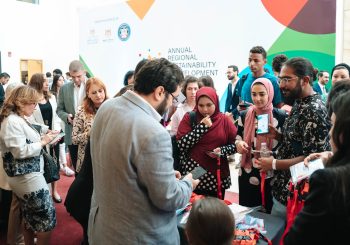Generative artificial intelligence has become ‘the next big thing’ in tech. From chatbots to multimedia generation and editing to automated note-taking, new tools using AI-based technology have garnered widespread attention in the past few months.
Generative AI is defined as “a type of Artificial Intelligence that can create a wide variety of data, such as images, videos, audio, text, and 3D models. It does this by learning patterns from existing data, then using this knowledge to generate new and unique outputs,” according to generativeai.net, a website dedicated to raising awareness of the technology.
“GenAI is capable of producing highly realistic and complex content that mimics human creativity,” the website wrote.
ChatGPT, a chatbot trained using generative AI technology, has been at the forefront of this surge in interest in AI.
ChatGPT can help write code, draft various texts in various formats, and simply answer questions about different topics. It has sparked a debate in academia as to whether AI can be used in assignments, and it has posed questions regarding the potential of automating content creation – most people express the view that AI cannot replace the human touch when it comes to creative endeavors.
Nevertheless, there is no doubt that ChatGPT and other AI-based models will change our lives, challenge the way we think about ourselves, and revolutionize many aspects of work. For Egyptians and the Middle East and North Africa (MENA) region at large, this has several specific implications as well as general ones faced by the whole world.
Here are some ways ChatGPT and other AI-based tools could affect Egyptians and the MENA region.
Water-consuming models in a water-stressed region
With climate change and the filling of the Grand Ethiopian Renaissance Dam, Egypt is facing pressures on its water supply. The government is actively working to counter the effects of these developments through building water desalination plants, but any further pressure on the water supply would pose a challenge to address.
Regionally-speaking, 15 out of the 25 countries with the highest water stress score in 2020 come from the MENA region.
With generative AI, which requires massive amounts of data, gaining mainstream prominence in the tech and business worlds, it is likely that there will be a proliferation of data centers which may reach MENA.
Data centers need to be constantly cooled to avoid overheating, with the most common method being cooling towers, whether directly or indirectly used to cool data centers. Cooling towers use large amounts of water.
A study published by researchers at UC Riverside and UT Arlington estimates the clean freshwater footprint of training GPT-3 – ChatGPT is currently running on GPT-4 – to be around 700,000 liters of clean freshwater. This is, according to the study, enough water to produce 370 BMW cars, which may not seem like a lot, but there are four relevant dimensions to consider.
First of all, this estimate is based on training which took place in Microsoft’s “state of the art U.S. data centers.” According to the researchers, training GPT-3 in Microsoft’s Asian centers would have used three times more water. Data centers in the Middle East would also likely be less water efficient than their US counterparts unless consciously designed to save as much water as possible – especially since there is no legal obligation to disclose water-usage data.
The second thing to keep in mind is that the 700,000 liters were used to train one version of one generative AI model. With rising attention and usage of this technology, there will be more models to train and more data to use.
The third dimension is that Egypt is suffering a water gap of 21 billion cubic meters, meaning it consumes more than it produces by a fair amount. Any further water usage would only serve to exacerbate the situation, especially since clean freshwater is scarce in Egypt.
Lastly, it’s important to note that this estimate only takes into account direct clean freshwater usage, and that there are indirect water uses stemming from electricity generation from non-renewable sources. The study terms this “off-site indirect water consumption.”
This all comes at a time where an already water-stressed region is facing increasing pressures due to climate change. However, there are solutions which may help mitigate the issue, such as building data centers that use renewable resources, as taking place in the UAE.
Privacy and Intellectual Property Concerns
An equally pertinent issue of a different nature is the challenge of regulating usage of ChatGPT and similar AI models.
There are several concerns including privacy, plagiarism and intellectual property issues, and authenticity. This is a worldwide debate that every country must address based on the local, regional, and global context.
Italian privacy regulators banned ChatGPT in Italy for various reasons, including the fact that it learns from data it did not have permission to use. This is a serious concern as any data on the internet, including one’s personal data, are being used to train the chatbot and similar models without owners’ permissions.
It is also worth mentioning that ChatGPT used to collect all input by users, meaning all chats with the bot are available for not only OpenAI, ChatGPT’s developer, to use, but also affiliates, vendors and service providers, and AI trainers. This represented a dilemma for users between wanting to take advantage of generative AI’s beneficial uses and safeguarding their information. To address this, OpenAI recently added the option to disable chat history.
The concern, however, does not stop at privacy – intellectual property is another major concern. As generative AI models learn from data on the internet, it follows that tech companies are feeding intellectual property to these models as things to learn from, and, most importantly, mimic, without compensating those that essentially helped teach AI how to give human-like output.
Lawyers, regulators, and users in the region will have to balance these concerns with the advantageous aspects of this new technology, securing people’s rights without risking getting left behind.
Getting Left Behind
ChatGPT is currently unavailable in Egypt and some other countries in the region. There is a possibility that authorities let the – justified – sense of fear of this young technology take over and shun usage of these models as well as local initiatives to develop AI technology. By doing so authorities would not only risk missing out on valuable advancements, but would also be subject to western biases literally programmed into models.
Automation has value in its uses, helping to streamline processes and increase efficiency. While over reliance on automation would be counterproductive, over-delaying automation would have the same effects as delaying digitization.
Egypt is currently working to digitize, and using AI technology – with regulation and in acceptable limits – to complement, and not eliminate, the human touch would go hand in hand with this direction.
Changing the Way We Work
It is clear that generative AI will change a lot of things, including work and education. It is difficult to ascertain just how many professions will change substantially, but there is a lot of discussion on the effect of generative AI on creative professions.
Most agree that while creative work may change, humans will remain at the center. Despite the release of a fully AI-made magazine with compelling visuals, the language was off and the pictures did not always reflect the spirit or content of the text.
However, it is not outside reason to imagine that, in the future, AI’s work and mimicking of creativity would be indistinguishable from human creativity – and soon; last month, April, a photographer refused an award as his picture was AI-generated.
Nevertheless, what AI lacks is emotion, which is key in creative endeavors – in the end, what is art except relaying emotion? Just knowing how someone was feeling when they put pen to paper or brush to canvas has value in and of itself. Knowing J.R.R Tolkien relayed the Shire’s beauty and the burning of Middle Earth’s trees in a time of industrialization and urbanization makes the work more pertinent and more beautiful because it is a lamentation and a love letter. It elevates the work from impressive to meaningful.
Raising Philosophical Questions
AI has already gotten people asking questions about the nature of art and creativity. As the technology becomes better and better at mimicking human output, more questions will be raised regarding the nature of friendship, how and why we work, the definition of intelligence, and what makes us human.







Comments (4)
[…] post 5 Ways ChatGPT Could Affect Egyptians and MENA first appeared on Egyptian […]
[…] Source link […]